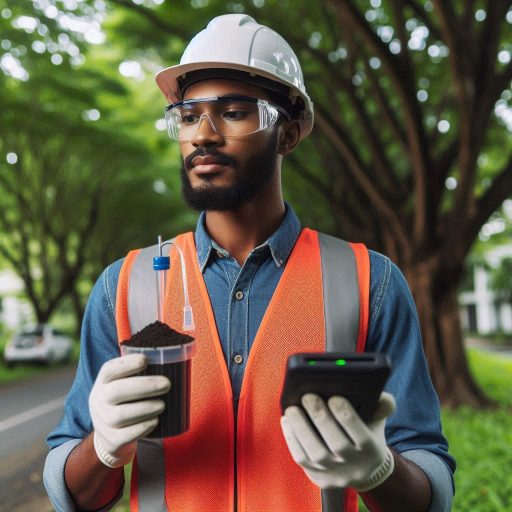Introduction
Environmental technicians play a crucial role in ensuring environmental compliance and protection.
Their work involves monitoring, testing, and analyzing environmental data.
Overview of Environmental Technician Role
Environmental technicians are responsible for collecting samples, conducting field tests, and maintaining equipment.
They work in various settings, including laboratories, field sites, and office environments.
Importance of Environmental Technicians in Today’s World
In today’s world, environmental issues are at the forefront of global concerns.
Environmental technicians help address these issues by monitoring air and water quality, identifying pollutants, and implementing solutions for a sustainable future.
Their work is essential for maintaining a healthy environment for current and future generations.
Technical Skills Required
Environmental technicians play a crucial role in safeguarding our environment and ensuring sustainability.
To excel in this field, professionals must possess a unique set of skills and knowledge that enable them to effectively carry out their duties.
Here are some of the top skills needed for environmental technicians:
Environmental technicians must have a solid foundation in technical skills to perform various tasks related to environmental monitoring and assessment.
These skills include:
- Proficiency in using environmental monitoring instruments and equipment
- Ability to conduct field investigations and sample collection
- Knowledge of laboratory procedures for analyzing environmental samples
Knowledge of Environmental Regulations
Understanding environmental regulations is essential for environmental technicians to ensure compliance and adherence to legal requirements.
Key aspects of this skill include:
- Familiarity with local, state, and federal environmental laws and regulations
- Ability to interpret and apply regulatory requirements to environmental monitoring activities
- Knowledge of permit applications and environmental impact assessments
Data Collection and Analysis Skills
Accurate data collection and analysis are vital for assessing environmental conditions and identifying potential risks or hazards.
Environmental technicians must have the following skills:
- Experience in collecting and recording environmental data accurately
- Ability to analyze and interpret data using statistical methods and software
- Skills in preparing reports and presenting findings to stakeholders
Understanding of Environmental Monitoring Equipment
Proficiency in using and maintaining environmental monitoring equipment is essential for environmental technicians to ensure accurate and reliable data collection.
This skill set includes:
- Knowledge of different types of monitoring equipment and their applications
- Ability to calibrate and troubleshoot monitoring instruments
- Skills in handling and safely disposing of hazardous materials
In a nutshell, environmental technicians must possess a diverse range of technical skills,
knowledge of environmental regulations, data collection and analysis skills, and an understanding of environmental monitoring equipment to excel in their field.
By honing these skills, professionals can effectively contribute to protecting the environment and promoting sustainability.
Read: How to Become a CAD Technician: Step-by-Step Guide
Communication Skills Needed
Environmental technicians must master communication to excel in their roles.
Effective communication ensures smooth teamwork and project success.
Here are key communication skills crucial for environmental technicians:
Ability to Work with Diverse Teams
- Collaborate with different experts: Environmental technicians often work with scientists, engineers, and regulatory officials.
They need to understand various viewpoints and integrate them into their work. - Adapt to different work styles: Working with diverse teams requires flexibility.
Environmental technicians must adapt to various team dynamics to achieve common goals. - Build rapport and trust: Establishing positive relationships with team members fosters a productive work environment.
Technicians should be approachable and respectful of diverse backgrounds. - Conflict resolution skills: Disagreements can arise in teams.
Environmental technicians should have the skills to mediate conflicts and find common ground quickly.
Strong Written and Verbal Communication Skills
- Clear reporting: Environmental technicians must write detailed reports on their findings. Their writing needs to be clear, concise, and free of jargon.
- Present data effectively: They often present data to non-experts. The ability to simplify complex information is crucial.
- Strong verbal communication: Whether in meetings or field discussions, technicians must articulate their thoughts clearly and confidently.
- Listening skills: Good communication involves active listening. Technicians need to understand instructions, feedback, and concerns from others.
- Technical writing skills: Documentation is a big part of the job. Technicians must be proficient in technical writing to create accurate, easy-to-read documents.
Effective Communication with Clients and Stakeholders
- Client interaction: Technicians often serve as the link between their company and the client.
They must communicate findings, recommendations, and updates clearly. - Stakeholder management: Environmental projects involve various stakeholders.
Technicians need to address their concerns and provide relevant information promptly. - Tailoring communication: Different stakeholders have different needs.
Technicians should adjust their communication style to suit the audience. - Negotiation skills: Sometimes, technicians need to negotiate project terms or resolve client concerns. Effective negotiation ensures all parties are satisfied.
Mastering these communication skills enables environmental technicians to excel in their roles, ensuring projects run smoothly and stakeholders remain informed and engaged.
Read: Surveying and Mapping Technician Internships: A Guide

Problem-Solving Skills
Environmental technicians often face complex challenges that require effective problem-solving skills.
These professionals are tasked with analyzing environmental data, identifying potential issues, and devising solutions to mitigate environmental risks.
In the field, problems can arise suddenly, from equipment malfunctions to unexpected environmental conditions.
An environmental technician’s ability to think on their feet and address these challenges efficiently is critical to their success.
Problem-solving also involves working with various stakeholders, such as government agencies, private companies, and the public, to ensure that environmental regulations are followed and that environmental protection measures are in place.
Critical Thinking Abilities
Critical thinking is essential for environmental technicians, as it allows them to evaluate information and make informed decisions.
This skill is vital when assessing environmental data, interpreting research findings, and applying scientific principles to real-world scenarios.
Environmental technicians must consider multiple factors, including the potential impacts on ecosystems, human health, and economic costs.
By thinking critically, they can identify the most effective strategies for addressing environmental challenges, ensuring that their actions are both scientifically sound and practically feasible.
This ability to analyze and synthesize information is crucial in a field where decisions can have far-reaching consequences.
Ability to Troubleshoot Issues in the Field
The ability to troubleshoot issues in the field is another key skill for environmental technicians.
Whether conducting soil tests, water quality assessments, or air sampling, technicians often encounter unexpected problems.
These could include faulty equipment, adverse weather conditions, or discrepancies in data.
Being able to quickly diagnose and resolve these issues is vital to maintaining the integrity of their work.
Environmental technicians must be resourceful, using their technical knowledge and experience to overcome obstacles.
Effective troubleshooting ensures that projects stay on track and that data collected is accurate and reliable, which is essential for informed decision-making.
Creativity in Finding Solutions to Environmental Challenges
Creativity is a valuable asset for environmental technicians, particularly when addressing complex environmental challenges.
Traditional methods may not always be sufficient to solve unique problems that arise in the field.
Environmental technicians must think outside the box, developing innovative solutions that are both effective and sustainable.
This might involve designing new testing methods, repurposing existing tools, or collaborating with other professionals to create multidisciplinary approaches.
Creative problem-solving not only helps to address immediate issues but also contributes to the advancement of environmental science by fostering new ideas and techniques.
This creativity ensures that environmental technicians can adapt to changing conditions and continue to protect our natural resources effectively.
Read: Top Surveying and Mapping Technician Employers
Transform Your Career Today
Unlock a personalized career strategy that drives real results. Get tailored advice and a roadmap designed just for you.
Start NowDelve into the Subject: Sustainability in Industrial Engineering
Physical Stamina and Outdoor Skills
Environmental technicians need to possess physical stamina to endure long hours of fieldwork.
They must be able to hike through various terrains and withstand physically demanding tasks.
Outdoor skills such as camping, orienteering, and wilderness survival are essential for this role.
Being in good physical shape is crucial for environmental technicians to perform their job effectively.
Willingness to Work in Various Weather Conditions
Environmental technicians must be prepared to work in all types of weather conditions.
They may need to collect samples or conduct surveys in rain, snow, or extreme heat.
Having the flexibility to adapt to changing weather patterns is a key skill for this role.
Being able to dress appropriately for the weather and stay comfortable is important for success.
Ability to Lift and Carry Equipment
Environmental technicians often need to transport heavy equipment to fieldwork sites.
They must be physically capable of lifting and carrying tools, samples, and other gear.
Proper lifting techniques are important to prevent injury and ensure safety on the job.
Having the strength and coordination to handle equipment is essential for environmental technicians.
Navigate Outdoor Terrain for Fieldwork
Fieldwork often requires environmental technicians to navigate through rugged outdoor terrain.
They must be skilled in using maps, GPS, and compasses to locate sampling sites.
Understanding topography and land features is crucial for efficient and accurate data collection.
Having the ability to navigate safely and efficiently is a key skill for environmental technicians.
Read: Networking Tips for Surveying and Mapping Professionals
Explore Further: Work Environment of Surveying and Mapping Technicians
See Related Content: Chemical Engineering Career Pathways and Options
Find Out More: Women in Automotive Engineering: Breaking Barriers
Environmental Education and Certifications
Environmental technicians need to have a strong background in environmental studies.
They should possess certifications in various areas such as air quality monitoring, water sampling, and soil analysis.
These certifications demonstrate their expertise and competence in handling environmental monitoring tasks.
Bachelor’s Degree in Environmental Science or Related Field
A bachelor’s degree in environmental science or a related field is essential for environmental technicians.
This formal education provides them with a solid understanding of environmental principles and practices.
It equips them with the necessary knowledge and skills to perform their duties effectively.
Certifications in Environmental Monitoring or Sampling
In addition to a degree, environmental technicians should hold certifications in environmental monitoring or sampling.
These certifications validate their expertise in collecting and analyzing environmental data.
They demonstrate their ability to conduct accurate assessments and measurements in various environmental settings.
Ongoing Professional Development in Environmental Regulations
To stay current in their field, environmental technicians must engage in ongoing professional development.
This includes staying up to date with environmental regulations and policies.
They need to understand the latest laws and guidelines that govern environmental practices.
Continuous learning ensures that they adhere to industry standards and best practices.
In fact, environmental technicians require a combination of education, certifications, and ongoing professional development to excel in their role.
By acquiring the necessary skills and knowledge, they can effectively contribute to environmental protection and conservation efforts.
Their expertise and commitment are crucial in safeguarding our planet for future generations.
Conclusion
Environmental technicians play a vital role in protecting our environment from harm.
With the right skills, individuals can make a significant impact in this field.
It is crucial for aspiring environmental technicians to develop the necessary skills.
By honing skills such as data analysis and fieldwork, individuals can excel in this role.
Environmental technicians are essential in collecting data and monitoring environmental conditions.
Their work helps to safeguard ecosystems and ensure sustainability for future generations.
As the demand for environmental technicians grows, having these skills will be invaluable.
In summary, the role of environmental technicians cannot be overstated in today’s world.
If you are interested in pursuing a career in this field, start developing these skills now.
Remember that every effort made by environmental technicians contributes to a healthier planet.
Explore resources such as environmental agencies and educational programs to learn more.
Take the first step towards becoming an environmental technician and make a positive impact.
[E-Books for Sale]
The Big Book of 500 High-Paying Jobs in America: Unlock Your Earning Potential
$19.99 • 500 High-Paying Jobs • 330 pages
Explore 500 high-paying jobs in America and learn how to boost your career, earn more, and achieve success!
See All 500 High-Paying Jobs of this E-Book
1001 Professions Without a Degree: High-Paying American Jobs You Can Start Now
$19.99 • 1001 Professions Without a Degree • 174 pages
Discover 1001 high-paying jobs without a degree! Unlock career tips, skills, and success strategies for just $19.99!




